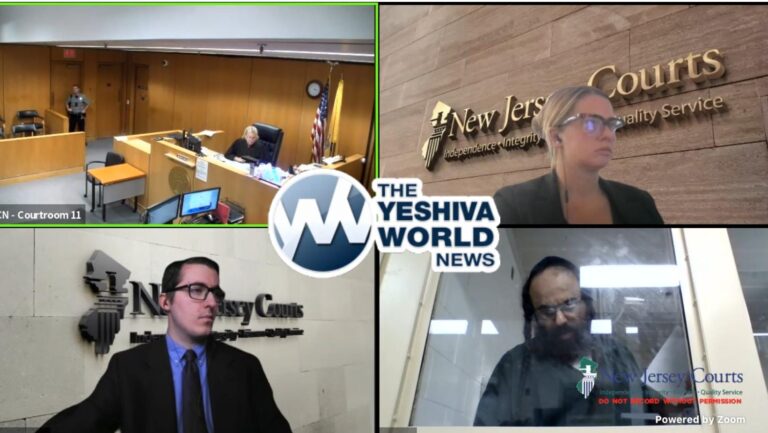 President Barack Obama’s announcement earlier this month that $275 billion from the financial bailout package will fund the Homeowner Affordability and Stability Plan is giving thousands of homeowners hope that they might yet be able to survive the economic crisis with their houses among their assets.
President Barack Obama’s announcement earlier this month that $275 billion from the financial bailout package will fund the Homeowner Affordability and Stability Plan is giving thousands of homeowners hope that they might yet be able to survive the economic crisis with their houses among their assets.
The infusion of federal funds to assist homeowners was also welcome news to the Southern Brooklyn Community Organization (SBCO), a division of Agudath Israel of America. For fifteen years, the not-for profit housing agency has helped hundreds of homebuyers in New York City, especially in Borough Park and Flatbush, with homeownership education and below-market-rate mortgages. Additionally, SBCO has awarded eligible homebuyers grants in the form of down payment and closing-costs assistance, is some cases to the tune of more than $40,000. More than three quarters of a million dollars’ worth of such assistance was provided by the agency over the past year alone.
At the end of 2008, SBCO was awarded a New York City grant and joined as a “program partner” with the Center of New York City Neighborhoods (CNYCN), in implementing a foreclosure counseling program. CNYCN was created by the Office of the Mayor to coordinate and expand services to New York City residents at risk of losing their homes to foreclosure. Through this partnership, SBCO’s counselors have been receiving extensive training in assisting clients at risk of losing their homes.
That training and assistance takes on special urgency now. President Obama’s plan focuses on three areas: refinancing for up to five million homeowners to make their mortgages affordable; modification of loans to allow struggling homeowners to remain in their houses; and an infusion of money into mortgage corporations Fannie Mae and Freddie Mac, with the goal of supporting low-mortgage rates.
As a result of SBCO’s grant, the agency’s counselors, Mr. Robert Brand and Mr. Henoch Grumet, are now more effectively able to help homeowners determine if any part of the federal government’s plan can alleviate oppressive mortgage payments or stave off foreclosure. Rabbi Yaakov Lebovits, SBCO’s Executive Director, points out that the agency also renegotiates on its clients’ behalf with lenders, and provides legal referrals if needed. Homeowners in Brooklyn, facing foreclosure are now being referred to SBCO by the City’s 311 Assistance Hotline. SBCO’s multilingual staff can be especially helpful to Hebrew, Yiddish and French speaking clients.
Mr. Brand cites the example of a couple that appeared in SBCO’s offices last December, in an agitated state. Their three-year-old adjustable-rate mortgage (ARM) had ballooned from an initial interest rate of 6% to nearly 10%. The couple could not afford the new monthly payments; they were overextended trying to keep their business afloat.
“They had tried speaking to someone at the mortgage company to work things out,” explained Mr. Brand, “but it just led to greater frustration.”
A former SBCO client had pointed them in the agency’s direction. “They helped me buy my home,” he informed them. “Maybe they can help you keep yours.”
“To make a long story short,” says Mr. Brand, “we could.”
He determined that the couple could afford carrying their mortgage at its original interest rate and began negotiations – a difficult task for a homeowner but less so for a trained counselor – with the mortgage company.
The mortgage servicer offered to adjust the mortgage to a fixed rate of 7.5%, which the SBCO counselor demonstrated still wouldn’t enable the clients to avoid foreclosure. (Recent surveys have shown that nearly 50% of modified mortgages redefault and fall back into foreclosure within 6-9 months.)
Eventually, the SBCO representative was handed over to a higher-up at the bank, who – after considerable negotiation – finally relented. The client was offered a modified mortgage with a 6% rate, and with some of the additional fees waived.
Says Mr. Grumet: “Unfortunately, many people falling into foreclosure start to feel desperate and fall prey to scam outfits that charge up-front fees and offer bad advice, leaving people in worse shape than when they began.”
“Homeowners,” he cautions, “should only seek assistance from reputable counseling agencies, and should never pay an up-front fee for services.” Given SBCO’s reputation and experience in working with the cultural and language barriers within its community, he avers, “we believe it is the natural place for residents to turn to for assistance.”
While no one can know at present if the current economic stimulus effort will succeed in putting the American economy back on track, the portion of it intended to help struggling homeowners, mediated by agencies like SBCO, is already doing its job.
(YWN Desk – NYC)











3 Responses
If the mortgage wasn’t affordable to begin with, why did the person agree to it to begin with. Perhaps they were speculating on housing prices,and having lost their bet, want the Treasury to make them whole. If I bet on the Mets to win the series last year (a reasonable bet, at least in March), and my speculation turned out wrong, shouldn’t I get bailed out as well. People who only bought houses they could afford, using traditional mortages (down payments, house costs being a reasonable multiple of income, etc.) have been unaffected by the crisis, and shouldn’t have to pay the bill for bailing out speculators who gambled by buying houses they couldn’t afford and using queer mortgages in hope of turning a quick profit.
Caveat 1: This doesn’t apply to someone who lost their job and has hope of finding a new one.
Caveat 2: Whomever made the speculative mortgage is just as guilty, and probably more so since they had better information, and the originators and purchasers of the loan should be seen as partners in the speculation, and are worthy of getting “stiffed” (bearing the loss).
They bet on America and were let down by Bush/Cheney.
It is easy to have 20/20 vision with hindsight. But I dont believe the homes, at the time, were unaffordable to people now struggling.
Does anyone really think a person making 30k a year was offered a mortgage and told their monthly payments would be 3k a month, and the prospective homeowner said, “We’ll take it,” and the mortgage company gave it to them?
By the way, I know some people who were very well off and they never gambled that after a year their payments would jump as high as they did.
Obama is doing the right thing for addressing this crisis of the American Dream.
Does anyone really think a person making 30k a year was offered a mortgage and told their monthly payments would be 3k a month, and the prospective homeowner said, “We’ll take it,” and the mortgage company gave it to them?
ACTUALLY, IT HAPPENED, though usually with the numbers being bigger – the logic is that they believed that the housing bubble would last forever, and they could refinance for a profit, to be divided by the lender and borrower, and meanwhile the borrower could live well behind his means…
By the way, I know some people who were very well off and they never gambled that after a year their payments would jump as high as they did.
ACTUALLY-with a traditional mortgage, which was fixed, with a down payment, and affordable at all times, increased payments would be limited to rising insurance rates and rising property tax.